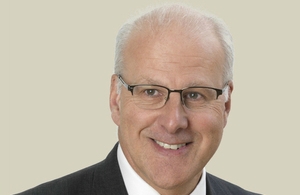FCA chairman Charles Randell has warned that the regulator will resist any calls for excessive financial de-regulation as Brexit looms and memories of the last financial crisis in 2008 fade.
He said there would be no “race to the bottom” in terms of regulation, as the UK leave the EU.
In a speech to the annual conference of the Association for Financial Markets in Europe (AFME) today he said: “The FCA does not see the UK’s withdrawal from the European Union as an opportunity to join a race to the bottom in regulatory standards – quite the contrary.
“We will need to redouble our engagement with our policymaking and regulatory colleagues in Europe and across the world, to continue to influence global standards of financial regulation.
“As last week’s IRSG Report on Global Regulatory Coherence within Financial Services rightly emphasises, strong global standards dampen the cycle of deregulation, crisis and regulation because they reduce the opportunity for individual jurisdictions to race to the bottom, and for firms to engage in regulatory arbitrage. Strong global standards also reinforce the competitiveness of the UK financial services sector.
“Open and consistently regulated financial markets bring benefits to consumers and businesses in all jurisdictions.”
Mr Randell said that he was not opposed to cautious deregulation where necessary and beneficial to consumers but he warned against a constant cycle of regulation and de-regulation.
He used the Greek myth of Sisyphus, who rolled a boulder up a hill only to see it roll down the hill repeatedly for all eternity, to underline his point on the dangers of a “cycle of financial deregulation, crisis and regulation that societies have gone through again and again.”
He added: “After each crisis, we bring in a weight of new regulation. We push it up the hill to implementation. And then we deregulate. And then a new crisis starts the process all over again.”
Memories of the financial crisis of 10 years ago are beginning to fade and along with this are coming calls for more de-regulation. Looming Brexit is also spurring calls for looser financial regulation, he said.
He said: “Some memories are beginning to fade, and there are voices calling for deregulation again. And secondly, as the UK leaves the European Union, we may have some choices to make about exactly how to achieve the regulatory outcomes we need to continue to deliver.”
He recalled the last time major de-regulation had caused major consumer harm when the stringent 1974 Consumer Credit Act cap on interest rates was lifted. This led, he said, to the rise of payday lenders charging high rates of interest until the interest rate cap had to be reintroduced in 2015.
De-regulation in the US and the desire to give more people access to home ownership had led to the rise of the sub-prime mortgage crisis as regulation was lifted, he added.
He said: “I would suggest that the most important way to avoid a damaging cycle of deregulation, crisis and regulation is to keep an open mind about the shortcomings of our existing rules. Not all deregulation is undesirable.”
“Nothing is more damaging to the cause of regulators than defending poor regulations if it’s clear that they produce perverse consequences, impose excessive costs that consumers and businesses ultimately bear and prevent innovation from which consumers and businesses would benefit.”

